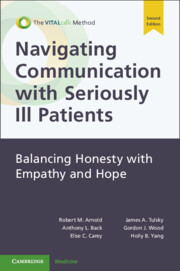Book contents
- Navigating Communication with Seriously Ill Patients
- Navigating Communication with Seriously Ill Patients
- Copyright page
- Dedication
- Reviews
- Contents
- Preface
- Acknowledgments
- 1 Taking Your Skills to the Next Level
- 2 Foundational Communication Skills
- 3 Talking about Serious News
- 4 Discussing Prognosis
- 5 Planning for the Future: Discussing What’s Important, Well Before a Crisis
- 6 Discussing Treatment Decisions
- 7 Between the Big Events
- 8 Goals of Care in Late-Stage Disease
- 9 Conducting a Family Conference
- 10 Dealing with Conflicts between Clinicians and Patients
- 11 Working Through Conflicts with Colleagues
- 12 When You’re Really Stuck
- 13 Talking about Dying
- 14 Cultivating Your Skills
- Index
- References
7 - Between the Big Events
Dealing with the Things That Surface in the Quiet
Published online by Cambridge University Press: 05 April 2024
- Navigating Communication with Seriously Ill Patients
- Navigating Communication with Seriously Ill Patients
- Copyright page
- Dedication
- Reviews
- Contents
- Preface
- Acknowledgments
- 1 Taking Your Skills to the Next Level
- 2 Foundational Communication Skills
- 3 Talking about Serious News
- 4 Discussing Prognosis
- 5 Planning for the Future: Discussing What’s Important, Well Before a Crisis
- 6 Discussing Treatment Decisions
- 7 Between the Big Events
- 8 Goals of Care in Late-Stage Disease
- 9 Conducting a Family Conference
- 10 Dealing with Conflicts between Clinicians and Patients
- 11 Working Through Conflicts with Colleagues
- 12 When You’re Really Stuck
- 13 Talking about Dying
- 14 Cultivating Your Skills
- Index
- References
Summary
The times in between significant medical events allow for different conversations with patients about living with uncertainty, the effects of their disease and its treatment, the fear of the next crisis, or figuring out who they are now and what they might hope for their future. Sometimes worry about becoming more ill or dying shows up in conversations in disguise, like being fixated on a particular test that a clinician might consider medically less important or even unnecessary. Sometimes completing cancer therapy brings a mix of emotion, relief that it is done and worry that it may not really be. Other times patients who have recovered from an exacerbation, like in heart failure, realize how much they have changed due to the disease and its treatment, and while glad they survived are simultaneously unhappy about how their life has changed. The roadmap for clinicians in these more calm but uncertain times is to ask your patient’s perspective, respond to their emotion (often exploring to create a deeper understanding), and offer your clinical experience of other patients which might apply to help clarify the issues at hand, provide different perspective, and offer support.
- Type
- Chapter
- Information
- Navigating Communication with Seriously Ill PatientsBalancing Honesty with Empathy and Hope, pp. 101 - 115Publisher: Cambridge University PressPrint publication year: 2024



